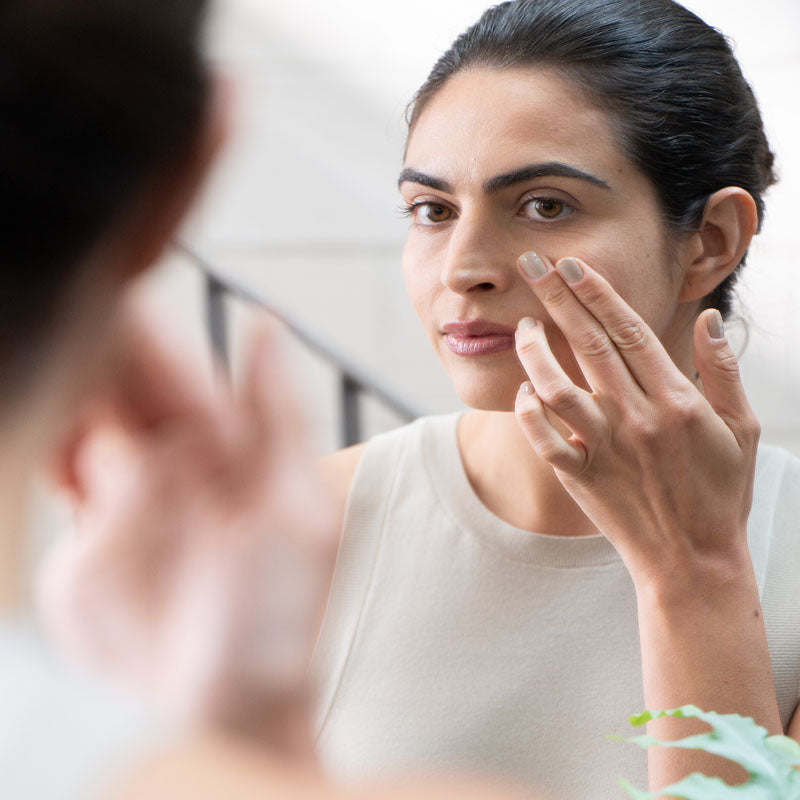The production and storage of sebum in the sebaceous glands is decisive for the size of your pores - genes and hormones also determine pore size. Is it possible to reduce the size of large pores? And how can you protect yourself from large-pored skin? We would like to answer these questions in the following article. In addition, we would like to recommend natural care aids for your daily care ritual, with which you can reduce the production of sebum and improve your skin texture in the long term.
- Beauty myth: Can large pores be shrunken?
- What is a pore?
- Causes of enlarged pores
- Your skin and the ideal skin care
- Enlarged pores and the right care
- Reducing large pores - dermatologist or esthetician?
- Preventing large pores: Which products are suitable?
- FAQ’s
- Sources
Beauty myth: Can large pores be reduced?
There are many tips and tricks for reducing large pores. Estheticians and even some dermatologists offer different methods, such as laser treatment or peelings, which are supposed to be able to refine large pores and improve the appearance of the skin. But does it really work?
Unfortunately, no. Because pore size can no longer be influenced in adulthood. The production and storage of sebum in the sebaceous glands is decisive in young years for the formation of large pores and even drastic measures such as laser treatment of the skin can do nothing against this.
What is a pore?
Your pores are skin openings and simultaneously the openings of the sebaceous glands. Through them, the sebum produced - i.e. your skin oil - is directed to the skin surface to protect the upper skin layer. When the sebaceous glands produce more sebum, a pore widens, because the sebum has to get to the outside.
The sad truth is: once you have large pores, they cannot be changed - not even with face masks, pore strips, laser treatments or creams.
Of course, you have the possibility to cover up blemished skin with a suitable make-up. However, you should make sure that your pores do not become clogged and even larger. This is especially important if you are prone to oily and blemished skin and suffer from blackheads and pimples.
Causes of enlarged pores
In addition to a genetic predisposition, there are several risk factors that can contribute to enlarged pores.
Changes in hormonal balance
Women are prone to regular skin changes that occur due to the menstrual cycle. The male sex hormone testosterone, which stimulates sebum production, is responsible for this [1]. As a result, the increased sebum produced cannot drain away. The pores become clogged and enlarged pores form.
In contrast, the female sex hormone estrogen influences the metabolism of skin cells, the formation of new collagen and the production of skin oils, which keeps your skin supple [2]. If the estrogen and progesterone levels drop at the end of the cycle - and with them the beauty-making hormones - the level of testosterone remains constant. Blackheads and pimples now have free rein.
Stress as a cause
Emotions also influence your pores. For example, you sweat from anxiety, turn pale from fear or red from embarrassment. If you are particularly stressed and anxious, this affects your pores, which are then more susceptible to impurities [3].
Harmful UV radiation
Exposure to the sun (UV rays) can accelerate the aging process of the skin [4]. As a result, the production of collagen and elastin, which keep the skin elastic and supple, decreases. The pores then enlarge because they become worn out. So always make sure you have appropriate UV protection.
Unbalanced Diet
An unbalanced diet has a negative effect on us and our health. It can also affect the skin. Surely you have heard that sweets, especially chocolate, can cause skin blemishes. However, the studies are not entirely clear on this matter. There is only evidence that sweets, like carbohydrates and dairy products, can stimulate sebum production [5].
Your skin and the perfect skincare
For the right treatment of your skin it is important to know which skin type you have. Generally, the facial skin can be divided into four different types:
- Normal skin: Ideally, you have normal skin that is not too oily and hydrated, but also not too dry. Your acid mantle is intact, you have soft skin that hardly needs any treatment and has no problem with pimples, blackheads or large pores.
- Oily skin: If you suffer from oily skin, it produces too much sebum and therefore appears oily and with large pores. The epidermis is very thick because the skin scales do not come off easily. A positive aspect: small wrinkles do not become visible so quickly.
- Dry skin: If you have dry skin, you probably have less problems with large pores than with the formation of wrinkles, dandruff or dilated veins on the cheeks.
- Combination skin: You have both dry and oily skin and large pores mainly on the so-called T-zone - that is, on the forehead, nose and chin. This area has the highest density of sebaceous glands. This requires very special care, because you need products that both moisturize and draw moisture away.
Enlarged pores and the right skincare
If you suffer from large pores, your skin produces too much sebum and more pimples and blackheads appear. Therefore, you either belong to the skin type with oily skin or with combination skin and can provide relief with the right products.
It is important that you do not pick at pimples and blackheads like crazy and aggravate your complexion. There is a high risk that you will push the sebum into the surrounding tissue and cause severe inflammation and even bigger pimples!
Shrinking pores – Dermatologist or esthetician?
Even if you cannot reduce large pores by a dermatologist or a cosmetician, you can still have your blackheads professionally removed and improve the appearance of your skin with various procedures, such as a fractional laser treatment. However, having your skin lasered is a big step that needs to be reconsidered. If you are considering such a treatment method, please get extensive advice.
One alternative is medical peelings, which can be performed by a dermatologist or a specially trained esthetician. This cleanses your skin down to the pores, so that a finer skin texture can develop.
Last but not least, you also have the option of covering the large pores. However, make sure that primer, make-up and foundation are labeled "non-comedogan" on the products. This means that the products are oil-free and do not clog the pores.
Don'ts of skincare
There are a few things you should keep in mind when caring for your skin to prevent pores from enlarging:
- Pore density is very high on the nose and it is prone to pimples and blackheads.
- Oily and greasy creams should not be applied to the nose.
Grease and oil-based primers or makeup are poison for large pores. - Please do not go to bed without removing your makeup. This will clog your pores.
- Use different towels for your face and hands.

Preventing large pores: what products may be suitable?
For your personal skin care routine, we would like to recommend three innovative and natural products. These not only help you prevent large pores and premature aging of the skin, but also help with various skin problems.
The revitalizing face cream The Glow contains selected ingredients that can moisturize your skin and inhibit inflammation. For example, cannabidiol (CBD), hyaluronic acid, zinc and extracts of cedar and olive leaves provide a balanced appearance and natural radiance.
To complement this, use The Morning Glow invigorating facial oil with cannabidiol (CBD), golden algae extract and geranium to nourish and hydrate your skin. To help your skin regenerate overnight, incorporate The Evening Glow facial oil into your daily skincare routine. In addition to cannabidiol (oil), oil extracts of blue tansy, we have deliberately chosen the natural retinol alternative bakuchiol as another ingredient. Thus, the extract from the Indian Babchi plant can alleviate redness, impurities and small wrinkles.
Take a little time out from everyday life with our holistically designed cosmetic products and create a daily ritual that offers you peace and support. Connect with yourself as part of the all-important self-care and pamper your skin at the same time.
FAQ’s
Can large pores shrink back to a smaller size?
No, unfortunately, enlarged pores cannot be reduced. Once the pore is dilated, it will not retract. However, with the right treatment or care, large pores can be prevented. There are also some tips and tricks on how to refine the look. Above all, skin cleansing and good products for care are important. It is also important to protect the skin every day from the UV rays in the sunlight. Because these damage the skin cells, which also affects the pores. This makes it more difficult to secrete sebum, so there is a risk that the pores will enlarge even more.
How can you reduce large pores?
Large pores are a skin problem for many people. Although large pores cannot be reduced, there are various treatment methods and options for making the skin look more even and fine-pored. On the one hand, appropriate treatments can be used by a dermatologist or an esthetician, and on the other hand, those affected can also become active themselves. With the right care routine and natural products, coarse-pored skin can be treated very well..
Why do you get large pores?
In young years, there is usually a fine and even skin appearance. However, the increasing aging of the skin causes the pores to expand and the skin surface to appear uneven and " speckled ". An additional risk factor that can enlarge pores is excessive sun exposure. Both age and UV radiation cause collagen and elastin production to decrease. This causes the tissue to slacken and the pores to enlarge.

